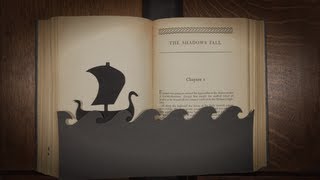(单词翻译:单击)
Mysteries of vernacular: Window.
通用俗语的谜团:Window。
An opening constructed in a wall to emit light or air.
Window指的是在墙壁上开的一个洞,用来让阳光和空气流动。
When the Scandinavian settlers invaded England in the Middle Ages,
当斯堪的纳维亚移民在中世纪入侵英格兰的时候,
they brought with them a whole slew of words
他们带来了丰富的字体和词汇,
whose modern descendants have become part of our everyday vernacular.
这些词汇随着年代的变迁已成为我们日常生活中的用语。
Their word for window was related to the Old Norse word for the same architectural feature, vindauga.
他们的“窗”(window)与古诺尔斯语中的“窗口”(vindauga)有关,都是当时的建筑特色。
Vindauga was a compound, composed of two separate words: vindr, meaning wind and auga, meaning eye.
vindauga是一个复合词,由两个不同的单词构成:vindr代表风,auga代表眼睛。
The word vindauga was probably quite old, having come into being long before windows were made of glass.
vindauga这个词可能很悠久,从窗户还不是玻璃制的时候就已经诞生了。

This type of metaphoric compound, called a kenning, was very popular in both Norse and Old English.
这种类型的隐喻复合词称为kenning,在古诺尔斯语和古英语里都是非常普及的。
The beautiful literary trope was used in the Norse word for ship, literally "wave stead."
这种优美的文学比喻,可以在古诺尔斯语里“船”这个单词中发现,字面意思是“wave stead”。
And, in the epic poem, "Beowulf," where the sea is described as a whale road
另外,在史诗《贝奥武夫》里,大海被形容为一条鲸鱼之路,
and blood is described as battle sweat and slaughter dew.
而血则被形容为战争之汗、杀戮之露。
From its literal yet lyrical beginning, the word window has expanded beyond its concrete definition
从其直白但抒情的伊始,window这个词就已经超越了其具体的定义。
as a construction or design element to be used figuratively in phrases like the poetic "window of opportunity."
它不止是一个建筑或设计的元素,而是可以用作比喻,就像在这个充满诗意的词组里:“机会之窗”。


